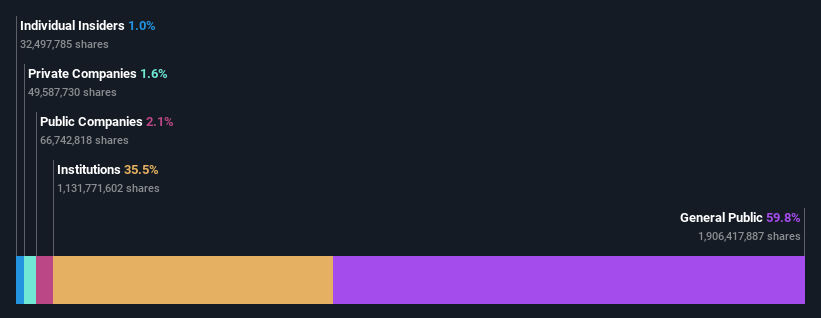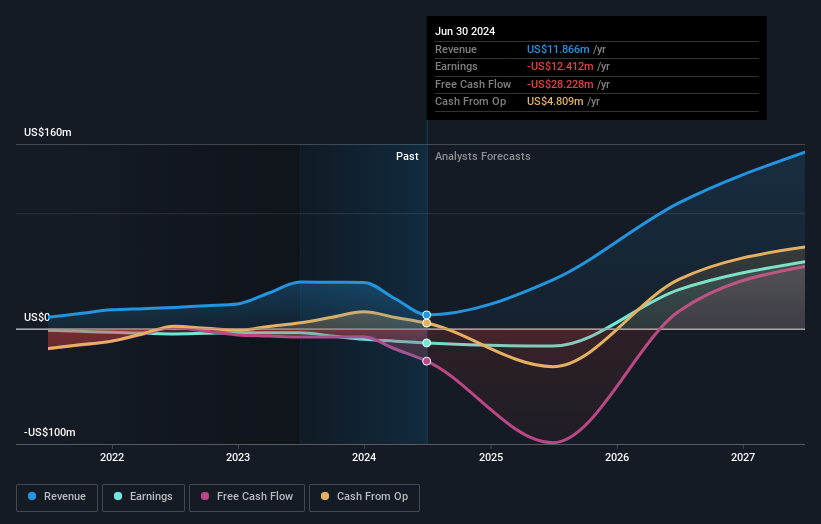- Australia
- /
- Oil and Gas
- /
- ASX:PEN
Peninsula Energy Limited's (ASX:PEN) market cap dropped AU$38m last week; individual investors who hold 60% were hit as were institutions

Key Insights
- Significant control over Peninsula Energy by retail investors implies that the general public has more power to influence management and governance-related decisions
- The top 24 shareholders own 40% of the company
- Insiders have bought recently
A look at the shareholders of Peninsula Energy Limited (ASX:PEN) can tell us which group is most powerful. We can see that retail investors own the lion's share in the company with 60% ownership. In other words, the group stands to gain the most (or lose the most) from their investment into the company.
While institutions, who own 36% shares weren’t spared from last week’s AU$38m market cap drop, retail investors as a group suffered the maximum losses
In the chart below, we zoom in on the different ownership groups of Peninsula Energy.
View our latest analysis for Peninsula Energy

What Does The Institutional Ownership Tell Us About Peninsula Energy?
Institutional investors commonly compare their own returns to the returns of a commonly followed index. So they generally do consider buying larger companies that are included in the relevant benchmark index.
We can see that Peninsula Energy does have institutional investors; and they hold a good portion of the company's stock. This suggests some credibility amongst professional investors. But we can't rely on that fact alone since institutions make bad investments sometimes, just like everyone does. When multiple institutions own a stock, there's always a risk that they are in a 'crowded trade'. When such a trade goes wrong, multiple parties may compete to sell stock fast. This risk is higher in a company without a history of growth. You can see Peninsula Energy's historic earnings and revenue below, but keep in mind there's always more to the story.

We note that hedge funds don't have a meaningful investment in Peninsula Energy. Our data shows that Sprott Inc. is the largest shareholder with 8.6% of shares outstanding. ALPS Advisors, Inc. is the second largest shareholder owning 8.1% of common stock, and Mirae Asset Global Investments Co., Ltd. holds about 6.9% of the company stock.
A deeper look at our ownership data shows that the top 24 shareholders collectively hold less than half of the register, suggesting a large group of small holders where no single shareholder has a majority.
While studying institutional ownership for a company can add value to your research, it is also a good practice to research analyst recommendations to get a deeper understand of a stock's expected performance. There are plenty of analysts covering the stock, so it might be worth seeing what they are forecasting, too.
Insider Ownership Of Peninsula Energy
While the precise definition of an insider can be subjective, almost everyone considers board members to be insiders. Management ultimately answers to the board. However, it is not uncommon for managers to be executive board members, especially if they are a founder or the CEO.
Most consider insider ownership a positive because it can indicate the board is well aligned with other shareholders. However, on some occasions too much power is concentrated within this group.
Shareholders would probably be interested to learn that insiders own shares in Peninsula Energy Limited. In their own names, insiders own AU$3.0m worth of stock in the AU$296m company. Some would say this shows alignment of interests between shareholders and the board, though we generally prefer to see bigger insider holdings. But it might be worth checking if those insiders have been selling.
General Public Ownership
The general public, mostly comprising of individual investors, collectively holds 60% of Peninsula Energy shares. This level of ownership gives investors from the wider public some power to sway key policy decisions such as board composition, executive compensation, and the dividend payout ratio.
Next Steps:
I find it very interesting to look at who exactly owns a company. But to truly gain insight, we need to consider other information, too. Case in point: We've spotted 1 warning sign for Peninsula Energy you should be aware of.
But ultimately it is the future, not the past, that will determine how well the owners of this business will do. Therefore we think it advisable to take a look at this free report showing whether analysts are predicting a brighter future.
NB: Figures in this article are calculated using data from the last twelve months, which refer to the 12-month period ending on the last date of the month the financial statement is dated. This may not be consistent with full year annual report figures.
New: Manage All Your Stock Portfolios in One Place
We've created the ultimate portfolio companion for stock investors, and it's free.
• Connect an unlimited number of Portfolios and see your total in one currency
• Be alerted to new Warning Signs or Risks via email or mobile
• Track the Fair Value of your stocks
Have feedback on this article? Concerned about the content? Get in touch with us directly. Alternatively, email editorial-team (at) simplywallst.com.
This article by Simply Wall St is general in nature. We provide commentary based on historical data and analyst forecasts only using an unbiased methodology and our articles are not intended to be financial advice. It does not constitute a recommendation to buy or sell any stock, and does not take account of your objectives, or your financial situation. We aim to bring you long-term focused analysis driven by fundamental data. Note that our analysis may not factor in the latest price-sensitive company announcements or qualitative material. Simply Wall St has no position in any stocks mentioned.
About ASX:PEN
Peninsula Energy
Operates as a uranium exploration company in the United States.
Exceptional growth potential with excellent balance sheet.
Similar Companies
Market Insights
Community Narratives



